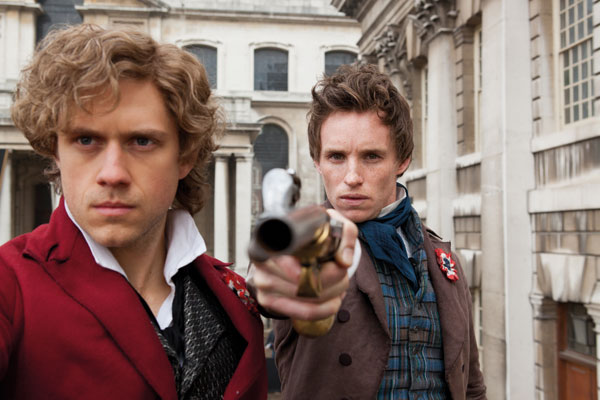Les Misérables is one of the longest-running, most popular stage musicals in history, having been seen by 60 million people in 42 countries — sit on that, Cats! — and although I can’t comment on the live show, as I’ve never seen it, I can tell you this film, which comes in at around 140 hours, boils down to a lot of fuss and singing (of the jaw-straining variety) about a very minor parole offence. I’m telling you, if I’d ever Dreamed a Dream, whether In Time Gone By or In My Local Starbucks, that so many jaws would strain so much for so little, I’d feel completely satisfied, but otherwise? I’m not so sure.
Directed by Tom Hooper, with a stellar, A-list cast — sit on that, all other casts! — and based on Victor Hugo’s 1862 book, which runs to a billion pages or something, this opens with Jean Valjean (‘No,’ says his mother, ‘I did not consider naming him Sue Valsue’) being released from prison after serving 19 years for stealing a loaf of bread. Valjean is played by Hugh Jackman, whose straining jaw makes Pierce Brosnan’s straining jaw in Mamma Mia! look almost relaxed. Anyway, upon his release, the prison guard, Javert (Russell Crowe), orders him to carry papers identifying him as a dangerous person and orders him to report to parole officers regularly. However, having robbed a bishop, who forgives him, Valjean breaks parole and devotes himself to good, but Javert is determined to pursue him, although we are never told why. Does he have nothing better to do? Does he have any other work, even? Valjean’s already served 19 years, for heaven’s sake! Seriously, this is a two hour and 40 minute musical about the world’s most minor parole offence. Imagine if Valjean had stolen a loaf and a bun. We’d still all be in the cinema. I’d have grown a beard. At my age, this is a genuine worry.
The main thrust is Valjean vs Javert, the thin one from Wolverine vs the fatter one from Gladiator, although there are other characters, including Fantine (Anne Hathaway), a single mother who is forced to become a prostitute. (Women don’t come out of this particularly well, and generally expire in the arms of some man.) Still, Hathaway is the business. She can really sing. Her ‘I Dreamed a Dream’ with a blotched face and red eyes and spittle in the corners of her mouth and filmed as if she were Sinéad O’Connor doing ‘Nothing Compares 2 U’ is wonderful. The best thing in this film by miles. Pity she expires in a man’s arms early on. (SPOILER ALERT…oops, too late.)
Other characters include Cosette (Amanda Seyfried), the orphan adopted by Valjean, who grows up and falls in love with Marius (Eddie Redmayne), who is part of the group that sparks the 1832 Paris uprising. Nothing wrong with Cosette and Marius except that, between them, they don’t have an ounce of personality. Marius is also loved by Éponine (Samantha Barks), who expires in a man’s arms. I do rather like Eddie Redmayne, though. Just do. And he may be the only other one who can actually sing, too.
All the cast emote their heads off and sing their little hearts out live to camera (there is no dubbing) but there is something inert about the whole thing. It is visually repetitive. Hooper’s camera swoops from epic shot to facial close-up over and over and over. It is narratively repetitive. Javert only stops plodding after Valjean to sing about law and justice yet again. There is never any pause to build character or emotion and the music slurs together indefinably. Everything is sung, to the point where you want to stop it all and say, ‘Just talk, why don’t you?’ And everything is elemental. It’s love, betrayal, hate, fear, but never: ‘Oh, hello. How are you? Cup of tea?’ There is dark but no light, and no wit or humour at all. Helena Bonham Carter and Sacha Baron Cohen do their shtick as small-time swindlers but it all feels wearily familiar, as if they’d been directly imported from Sweeney Todd. I was dying for Nancy to come in and do ‘Oom-Pah-Pah’ or something, and cheer us all up.
What I’m saying, I think, is that it’s just so soaringly monotonous. It might have been different on stage, where the business of staging something so epic would be more impressive, but I’ll never know. I cried, obviously, but that means diddly-squat. I cry at puppy and kitten videos. I cried when Rachel and Ross finally got together in Friends. It is never a recommendation. And although hard-core fans will love this whatever, and good luck to them, I’d rather set fire to my own hair than ever have to sit through it again. It would be over quicker, at least.
Readers who have not come across Deborah Ross’s film reviews before can find the rest here.






Comments